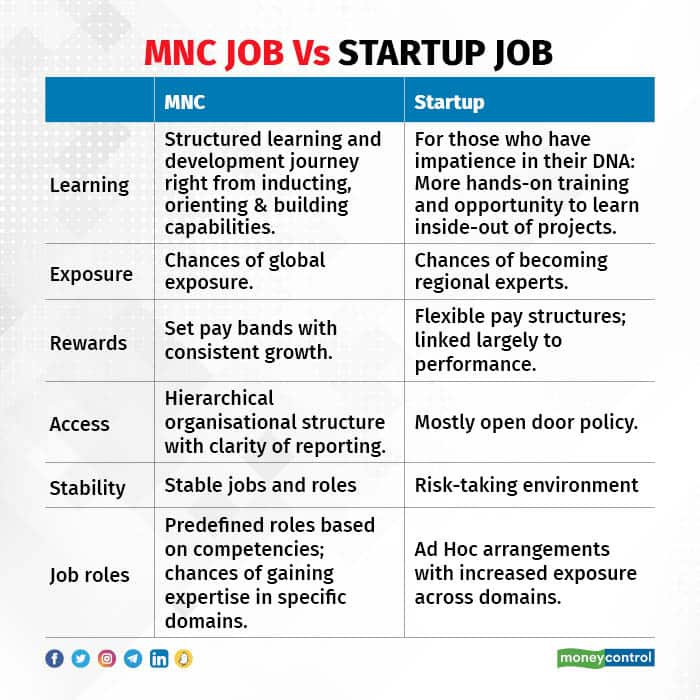



When Priti completed her graduation and decided to begin her professional journey, she had a fork-in-the-road moment: should she join a large multinational corporation or a startup?
Priti did what many others do: she asked seniors and relatives employed in both kinds of companies for their advice and suggestions. Each had their own take and guidance and in the end, Priti was left all the more confused.
In an attempt to solve this issue, Moneycontrol spoke to leaders working in a range of MNCs and startups and explored the conundrum of choosing the right kind of company to start one’s career. Here are some key differences:
MNCs ideal for step-by-step guidance
MNCs provide a structured learning and development environment, right from inducting, orienting and building capabilities, including technical and soft skill development, according to Prashant Mehra, a partner at Grant Thornton Bharat, part of the accounting firm Grant Thornton.
“MNCs provide accelerated career development as well, which gives an edge over other organisations that struggle to induct and orient freshers well,” he said, adding that non-MNCs do not provide a career plan because of which they lose talent early.
The 125-year-old Godrej & Boyce has a comprehensive corporate orientation programme for onboarding new employees. Thereafter, there is a programme called Buddy Connect to facilitate smooth onboarding and transition for new hires who are paired with an experienced employee for six months.
This gives newcomers the “necessary support, guidance, encouragement and a friendly environment, which enables them to accelerate their familiarity with the organisation’s work culture, values, processes and procedures,” said Harpreet Kaur, head of corporate personnel & administration at G&B.
Startups suitable for problem-solvers
Startups usually operate with a problem-solving and product-oriented approach and a fresher joining during that phase gets to experience live projects early on, said Nishigandha Shendge, an HR manager at tech startup Fynd (Shopsense Retail Technologies).
“They (freshers) get more hands-on training about the industry and the specific task on the go. This way, freshers get to know their projects inside-out and this builds a sense of ownership that compels them to put in their best efforts,” Shendge said.
A startup meets the needs of freshers who have a hunger to learn and have impatience in their DNA, said Sudeep Ralhan, CHRO of online investment startup Upstox.
“Exposure to a wide range of work tasks in a boundaryless organisation can broaden the minds of someone who's just starting and accelerate their career,” Ralhan said.
MNCs provide extended exposure, stability
Years of global experience make MNCs more agile and adaptable to the constantly evolving business playfield that is disrupted intermittently by all-pervasive technological advancements, said Rajiv Srinivas, SVP for talent strategy at Maveric Systems, a bank-tech company.
“They offer more stability and surety of growth,” he said.
Srinivas said seasoned MNCs can also predict solutions and services that their customers require and thus provide more stable environments for innovation.
Compared with MNCs, Srinivas said startups develop and build solutions and services while studying on-ground market trends and understanding potential opportunities.
“The risk elements are high, especially those startups in the nascent stage yet to be funded,” he said.
Startups provide risk-taking, intersectional skills
Shyam Murugan, cofounder of fintech startup BharatX, said one major aspect that the startup ecosystem provides professionals is intersectional skills with complete ownership of tasks, projects or any other form of work.
“The startup ecosystem gives a fresher the opportunity to work with departments/domains across the company, often helping them learn a multiplicity of skills and clarity over interests and competencies,” said Murugan.
Besides, he points out that the structure of a startup, which allows complete ownership of tasks and projects, often also gives a fresher the space to make mistakes and grow at an increasing pace.
Founding member Jainam Sanghvi rejected an offer from an MNC right out of college to join BharatX. He aimed to build something impactful in a short period while having the space to grow and imbibe skills at an increasing pace.
“An absence of a rigid hierarchy allows freshers to make more decisions,” said Murugan.
MNCs offer better work-life balance
According to Ameya Sane, HR director at mass customisation firm Cimpress India, exposure to the right experience and the right workplace is very important at the onset of one's career, which is generally not present in a startup culture.
Sane said there is no second thought to the fact that an MNC values its employees more than a startup.
“A startup that is aiming to grow higher often neglects the growth and work-life balance of its people. This is one aspect that is best taken care of by an MNC,” Sane said.
He said the structured working style, better operational ability, and legal compliance makes job security better at MNCs than in startups.
“This means as a fresher, you can focus more on your work than the fear of losing your job,” he said.
Experts said large corporations have a better understanding and the resources for mapping down the career trajectory of each individual. When the six-decade-old travel firm Sabre Corporation hires freshers from the campus, it can give them the project outlook for the next year.
Similarly, Sabre’s organisational plans for its products and business have been defined for 2025 and beyond.
“We also have most of the leaders visiting global locations regularly, opening more prospects of closer interaction,” said Rency Mathew, people leader for India and South Asia at Sabre. “Sabre solutions are utilised by many airlines and partner agencies that give freshers a view into how global businesses support each other.”
Startups teach liberty, adaptability
The most important aspect for freshers working in a startup is that they get to experience a balance of both liberty and adaptability.
“With constantly changing requirements and priorities, freshers learn how to adapt and think on their feet,” said Ojaswini Sapatnekar, head of people strategy at IoT company Intangles.
She said the fast-paced environment does not compromise the innovation and creativity quotient because it gives candidates the liberty to innovate and explore new avenues.
Unlike MNCs, startups mostly have flat structures where a substantial number of employees stand on equal ground.
“Everyone’s opinion is valued, which promotes overall inclusivity in the workplace,” Sapatnekar said. “This setup is hard to come by when we speak of MNCs or large-scale organisations.”

Before you decide
Before freshers decide to join an MNC or a startup, experts have one piece of advice: candidates need to free their minds from three things—the urge to impress relatives, heavy salary slips in the beginning, and demand for international exposure.
Instead, they should realise that a job is all about the experience—if there is job satisfaction, everything else follows.
“Each kind of job is unique and brings with it its challenges and opportunities,” said Ralhan of Upstox. “Students should do their research and align jobs with their drivers.”
Discover the latest Business News, Sensex, and Nifty updates. Obtain Personal Finance insights, tax queries, and expert opinions on Moneycontrol or download the Moneycontrol App to stay updated!
Find the best of Al News in one place, specially curated for you every weekend.
Stay on top of the latest tech trends and biggest startup news.